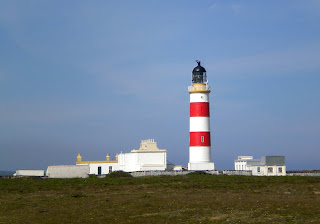
No, we haven't moved. This is Point of Ayre lighthouse and, on good days like today, we can just see it from the office windows. It's about twelve miles away across Ramsey Bay. Not only can we see the lighthouse, we can also see the tidal rip which stretches for about ten miles and is strongest six hours before and six hours after high water at Liverpool. For the non-technical among us, it's a powerful current and you don't mess with it. Point of Ayre is the northern tip of the Isle of Man and the island itself is roughly midway between England/Scotland and Ireland. The lighthouse was built in 1818 and lit a year later, after mariners from Liverpool lobbied those in power about the dangers of the Manx coast. A lighthouse is obviously designed to work best at night, but still acts as a landmark during the day: each is painted slightly differently, so mariners know which one they're looking at. They do have to be paying attention, however. C...


